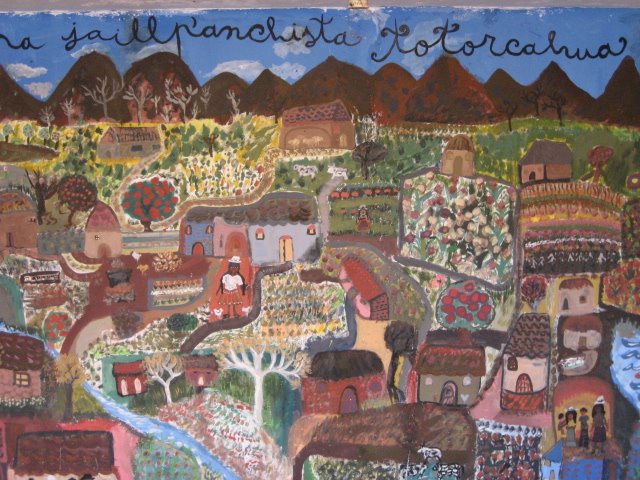REFLECTIONS ON RACISM
(mid July, 2007)
There, unfortunately, exists very little interest in understanding the dominant vision of “progress” and “development”- the ways they are driving all of our increasing problems, especially in regards to racism- nor is there much desire or willingness to explore solutions to our social ills that may arise out of our immediate, local contexts, especially when all of our leaders/authorities are conditioned to seek the answers solely in “Western” thought structures. So the constructed beliefs and myths continue in a very effective manner, like the belief that the spirituality of the indigenous peoples was “assimilated” into Christianity, when in fact, from the very beginning, there was a natural inclination among the indigenous towards respect and recognition of the “Other”, as opposed to tolerance and assimilation.
For the Andean everything can be cultivated, nurtured, welcomed, where the Western economic notion of “scarcity” does not exist. People interacted with each other in a manner that transcended differences without dissolving into one whole unformity. Sadly, this dynamic of universalization, or homogenization, flourishes in the modern guise of “syncretism” (the “positive” and “beneficial” absorption of indigenous rituals into institutionalized Christian traditions). Originarios (original people) who currently practice Andean rituals are deemed ignorant or backward. The modern educational system strives to indoctrinate the communal-minded man into individualism- based upon the distrust of “the Other”, preparedness for competition within heirarchies, instructed in the violent struggles for economic resources, armed with the fear of subsistence, perpetuating the terror of scarcity.
The war continues against the “poor” and the “illiterate”, the majority of whom are campesinos (farmers, or country folk)- the very ones who nurture biodiversity in their region, keeping at bay the notion of scarcity, and whom safeguard the wisdom of subsistence from the mediocre notion of “progress”. But nevertheless it is them and the subsequent generations of the uprooted (these latest, victims of the untiring pressures of colonization; debilitated, urbanized) who are blamed for the perpetuation of more “poverty” and “ignorance” and considered, along with their rooted traditions, to be the greatest obstacles to “progress” and “development”.
The hatred and scorn of/for the “Other” continues prowling about, after more than five hundred years, carrying with it the modern domination of economic power over all values, fueling even more racism, and discrimination against all who perceive life differently, who keep the economy subsumed to the life-giving values of the community. The same colonization of old continues to declare war, as noted by Ivan Illich, “against subsistence.” ;against all the forms and diverse systems of collective subsistence, attacked by the imposition of new “needs”, continously pillaging natural resources in order to sustain the elite. The destruction of subsistence signifies the dependency upon one dominant global system- “the global industry of ‘development’”.
The path towards “the end of privilege” could be the path towards the end of this infinite war. Dismantling the chains of injustice and terminating the continuing exploitation of people and places in the name of “privileges” is our pressing challenge, our daily practice.
Valentina Campos
Totorkawa-Cochabamba, Bolivia
(translated by Jack Herranen)




No comments:
Post a Comment